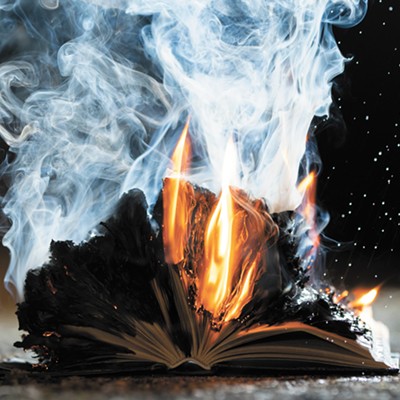PREFACE: In order to present his blistering dystopia E.J. Iannelli (an Inlander contributor) makes an odd choice. Rather than focusing on the life-on-the-streets reality of this world he’s created, he writes the story from the perspective of one of the scientists who brought it to bear. It reads like a chapter from a memoir of a man who perhaps recognizes the horror he has helped create while deluding himself into thinking that he has served some greater good. There’s no discernible plot here, but there is a strange and veiled history to take its place. That history is gripping, and the final line is among the most haunting in all of the contest entries. (Luke Baumgarten)
*****
"Seeking to forget makes exile all the longer; the secret of redemption lies in remembrance." — Richard von Weizsacker
It started with the discovery at the top levels of science that the mere act of observing a particle of light forced it to favor one side of its dual nature and behave as a particle rather than a wave, or vice versa — that is to say, it was proven that the events of the present moment can in fact have an impact on events we considered already consigned to the immutable past.
From there, it wasn't long before this quantum-mechanical observation, gibberish to the layman, was harnessed by the pioneering geniuses of physics, then built into a working model, and from there funded, patented, mass-produced, marketed, and given a practical application in the form of consumer technology. A new field — medical, understandably — of professionals trained in its operation came into being. I count myself among the first and best of them.
The interest in this type of manipulation barely registered at first. Its utility wasn't obvious, its promise still guesswork. I tried explaining to my parents, by then gray-haired and ideologically rigid, what it all meant, what it would mean, and they shook their heads out of incredulity and incomprehension. Their dissent wasn't on philosophical grounds, which I could have appreciated, even admired; rather, it stemmed from an appalling lack of imagination, their fundamental inability to envision anything beyond the status quo. But the status quo is nothing more than the product of all the dull conventions and received wisdom of the past slotting together in a way that appears substantial, reliable, concrete. In the hands of this new technology — in our trained hands, in mine especially — concrete would become quicksand.
Rich clients, of course, began to come forward initially. They had made their fortunes by having the foresight to fill a commercial niche, and they quickly identified the niche to be filled by our alterations — no doubt because the path to their fortunes put them in need of the same.
I recall — although I shouldn't, I can; occasionally there are ways, pockets of the infinite mind in which to hoard and to hide what has for all intents and purposes never existed — one such captain of industry, married, who'd begun an affair with an executive of a rival company with an eye toward identifying vulnerabilities and in turn securing a far more attractive takeover price. He had, however, fallen in love, or what he mistook for it, and later, some time after he'd purchased the competitor for a song, he abandoned his wife and children, doing everything in his considerable power to ensure that they didn't curb his personal apogee by claiming anything but an unlivable pittance in alimony. But after a time, the luxury of his success supplied him with moments for reflection, and his long-suppressed conscience began to surface. His regret and pervasive shame came to sully his economic and romantic triumphs. Without such a past, he would be free to enjoy them, his spoils unspoiled. A perfect candidate.
Soon the military become involved. How could they not? They posed their inquiries in cold euphemisms for death and brutality, asked us in that detached, reticent way of high-ranking career officers to demonstrate our newfound control. Cleaner than drugs, one murmured. More effective than hypnosis, said another. A wonder they hadn't come calling sooner. Or maybe they did. Who can be sure of anything anymore? We have long since shredded the fabric of time so thoroughly that the clear lines of history, of cause and effect, once so easily traceable, now end in clouds and cul-de-sacs.
But those were the early days; we were preoccupied with the giddy potential, not the sobering possibilities. What would incline us to lend even a moment's thought to the nebulous, unknowable future when we were presented with the ability to redraw the footsteps we had already placed in the sand?
Enthusiasm quickly gave way to obsession, gave way to need. After a period of experimental outsourcing, jails and other correctional institutions developed in-house operations. They made free men of criminals by eliminating their crimes. Recidivism lost all meaning. This was lauded at the time — at that time, I mean —both by the philosophical left and by the political right. The former viewed it in humanitarian terms, arguing that it was the noblest use of science ever carried out by mankind, whereas the latter saw it through the distorted prism of faith and sin, a dry baptism conducted on an industrial scale by a species elevated to the level of God's storm troopers. No one asked after the victims, because they were victims no longer. And in most cases that was true, only in a sense that was far more absolute.
I see my sympathies have strayed and with them my clarity of thought. I ought to know better than to speak of absolutes. One should speak instead of absolution.
Because, even in its imperfect form in that faraway alternate past, what was its aim if not a complete dissociation from one's illusory former self? To say to others, to delude ourselves in secret, Yes, it was me who behaved badly, but it was not me. It was the circumstances, the drugs, the devil, the planets' alignment. I've changed, I am different, restored, reborn; this is the real me, and then to continue on in the dubious conviction that it was all just an aberration, as if the present, wiser, repentant self were the only one to have existed all along. But, really, that was all just hopeless play-acting on a mundane level, and so it was doomed to be until physicality was no longer inextricably bound to temporality.
Know this, though: I am not blind to the dilemma. I am aware of what must be lost for us to continue our march toward perfectibility. Shaw — Shaw! what deserves to remain of him, of any of his ilk now? — recognized it too in his own way, in a play where he had one of his characters recite what ought to have been dubbed the Apostate's Creed:
I believe in Michelangelo, Velasquez, and Rembrandt; in the might of design, the mystery of colour, the redemption of all things by Beauty everlasting, and the message of Art that has made these hands blessed: Amen. Amen.
The artist's faith in beauty, the fundamentalist's faith in God — these are such patently poor paths to redemption because they are only as perfect as their practitioners. We have leapt beyond that. We remove ourselves from ourselves. In the rare quiet of the universe we are constantly recreating, there are still the faintest echoes of the other possible presents, those which do include our mistakes, our faux pas, our sins, our crimes, our infinite capacity for evil. Here we experience the true contentment that comes from knowing that we are continuously and cleanly outpacing them.
We are adrift, yes. We have minced the gossamer threads that moored us to a tidy beginning, and we continue to dice them ever finer as we alter and edit our chronology. But we are utterly free of the pangs of guilt, of remorse; we are separated by a vast cosmos from our nightmares and demons. We no longer seek to forget because there is nothing pernicious to remember. If this is not beauty everlasting, it is surely the highest form of bliss. It is purity. It is divine.
The Inlander's Short-Fiction Contest
After a one-year hiatus, we’re back with a different kind of fiction contest. This year, we shortened the word limit (to 1,500) and added a thematic requirement (tell us something about redemption). Thirty-two regional writers responded with stories involving dystopias and disillusionment, broken relationships and ghosts, the Civil War and Earth, Wind and Fire. A panel of four Inlander writers — Luke Baumgarten, Nicholas Deshais, Jacob H. Fries and I — evaluated the entries.
Here we present our favorite story, Robert Salsbury’s “Resource Management,” along with “Alive and Well,” “A New Mexico Story,” and three runners-up.
— Michael Bowen























